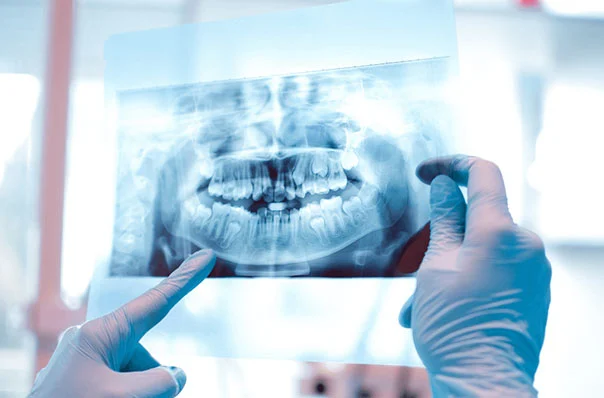A dental implant is a surgical treatment that includes inserting a tiny, biocompatible metal post into the jawbone to replace a lost tooth. The implant is then covered with a custom-made dental crown that is meant to appear and operate exactly like a natural tooth. Women frequently select dental implants as a replacement for lost teeth because they may help restore their self-esteem and femininity. Dental implants, as opposed to traditional dentures or bridges, are a permanent option that is securely attached in the jaw, allowing for a comfortable and natural biting and speech. Dental implants can also assist to retain face structure and prevent bone loss, which can contribute to a more young and feminine look.
We greet you at the airport. The initial consultation with the dentist will thereafter take place. The teeth and gums are examined, X-rays are obtained, and treatment alternatives are reviewed. Patients will be provided preparation instructions for the implant process.
The implant operation begins. Under local anaesthetic or IV sedation, the implant is inserted into the jawbone. The treatment usually takes between 1-2 hours. Following the treatment, the patient will be given information on how to care for the implant site as well as pain relief alternatives.
Continue the healing process at home by following the implant dentist's recommendations on how to care for the implant site, what to eat and drink, and how to manage any pain or discomfort. You are allowed to go about Istanbul during the day as long as you follow the doctor's instructions.
Appointment with the implant dentist to monitor the healing process. We monitor the implant screws for any issues. You have the rest of the day free to relax and recuperate as long as everything is well.
While the permanent implants are being prepared, you receive temporary implants. You will receive your permanent ones after 3 months after recuperation. We recognize that undergoing dental implant therapy may be stressful and time-consuming, which is why we are dedicated to assisting our patients every step of the way.
 Day
01
Day
01
 Day
02
Day
02
 Day
03
Day
03
 Day
04
Day
04
 Day
05
Day
05
Most women who are missing one or more teeth can benefit from dental implant therapy. A suitable candidate for dental implant therapy is someone who is in good general health, has a strong jawbone, and is dedicated to proper oral hygiene. Women who smoke heavily or have certain medical disorders, such as uncontrolled diabetes or osteoporosis, may be unsuitable for dental implant therapy. It is essential to visit with our dentists to decide whether dental implant therapy is appropriate for you.
To achieve success and best outcomes, dental implant therapy necessitates a precise set of conditions. The first prerequisite is that the patient have enough healthy jawbone to sustain the implant. If the jawbone is excessively thin or fragile, a bone grafting treatment may be required to strengthen it. The patient must also have healthy gums that are free of periodontal disease or infection. Before the implant operation can be conducted, any gum disease or infection must be addressed. The third criterion is that the patient be committed to practicing appropriate dental hygiene. This includes brushing, flossing, and frequent dental checkups to ensure the implant is healthy and operating correctly. Finally, the patient must be ready to commit to a recovery time following the treatment, which might take several months. The implant will merge with the jawbone at this period, and the tooth replacement will be inserted. Meeting these standards is critical for the effectiveness of dental implant therapy and ensuring its longevity. Dental implants, with correct care and maintenance, can help women restore their self-confidence and femininity by allowing them to eat, speak, and smile without feeling self-conscious about their missing teeth.
Dental implant therapy is often delivered in phases. The implant is surgically implanted into the jawbone in the first step. This is usually performed with local anesthetic or IV sedation. A tiny incision is created in the gum tissue, and a small hole is drilled into the jawbone during the surgery. The implant, which is a tiny, biocompatible metal post, is then put into the hole and sutures are used to seal the wound. The healing period, which normally lasts several months, is the second step of therapy. The implant will fuse with the jawbone at this period, and the abutment will be installed. The final step is to install the custom-made dental crown. This is usually done when the implant has completely merged with the jawbone and the abutment has been installed. The dental crown is intended to look and function similarly to a real tooth. As a consequence, ladies can reclaim their self-confidence and femininity by having a permanent replacement for lost teeth.
Dental implant therapy is a very successful and long-lasting option for women who are missing one or more teeth, but there are a few things to consider before proceeding with the procedure. The first consideration is the recovery period. Dental implant therapy necessitates a several-month healing phase during which the implant will merge with the jawbone. The devotion to adequate oral hygiene is the second factor to examine. Dental implant therapy necessitates a commitment to appropriate oral hygiene habits in order to keep the implant healthy and operating correctly. Dental implant therapy can be a highly successful solution for women who are missing one or more teeth, but the potential advantages must be balanced against the possible hazards and expenses. Consultation with our skilled staff is the best method to assess if dental implant therapy is correct for you.
Dental implant therapy is a very successful and long-lasting option for women who are missing one or more teeth, but there are a few things to consider once the treatment is finished to ensure the implant lasts for many years. The first consideration is appropriate oral hygiene. Dental implant therapy necessitates a dedication to appropriate oral hygiene habits. Brushing and flossing on a regular basis, as well as frequent dental check-ups, are critical for the implant's health. The second thing to think about is avoiding foods that might affect the implant. Hard, sticky, or crunchy foods should be avoided to avoid implant damage. The next item to think about is avoiding habits that might damage the implant. Grinding or clenching your teeth, as well as smoking, can be damaging to the implant and should be avoided. The fourth item to think about is scheduling frequent follow-up appointments with your implant dentist. These sessions are critical for monitoring the implant's health and making any required changes.
The healing phase after dental implants is an important component in the procedure. The body need time to repair and integrate the implant once it is implanted in the jawbone. This recovery period usually lasts several months. The implant will merge with the jawbone during this period, a process called as osseointegration. This procedure is required for the implant to be sturdy and secure. During the healing time, it's critical to follow your implant dentist's recommendations, which will include information on how to care for the implant site, what to eat and drink, and how to handle any pain or discomfort. After the healing time is through, the abutment, which is a connection that holds the custom-made dental crown in place, will be installed. After the abutment is installed, the dental crown is attached and the implant therapy is complete.
The primary benefit of dental implants is that they are permanent. The implant becomes a sturdy and secure foundation for the new tooth once it has fused with the jawbone. This results in a more natural and pleasant speaking and biting experience. The second benefit of dental implants is that they assist to keep the natural curves of the face and jaw. Traditional dentures or bridges can induce bone loss, giving the appearance of a sunken face. Dental implants stimulate the jawbone, assisting in its natural form and structural preservation. The third benefit is that dental implants do not require any extra care or maintenance other than routine oral hygiene routines. Traditional dentures or bridges need specific cleaning solutions and might be painful or ineffective. The fourth benefit is that dental implants can boost self-esteem and femininity. Women who are missing teeth may feel self-conscious about their looks, but dental implants can help them regain their confidence, allowing them to smile, converse, and eat with ease. For women who are lacking teeth, dental implant therapy can help restore self-confidence and femininity. It gives patients the courage to smile, chat, and eat without the humiliation or discomfort of conventional dentures or bridges. It also aids in the preservation of the natural contours of the face and jaw, contributing to a more young and feminine appearance. Dental implant therapy may be an ideal alternative for you if you are a lady who is missing one or more teeth.
 Before the Implant
Before the Implant
Prior to the implant, the patient may have missing teeth, which can make eating, speaking, and smiling difficult. Because of the lost teeth, the patient may have poor self-esteem and problems in everyday living. They may shun social events because they are self-conscious about their looks.
 During the Implant
During the Implant
The patient will have an initial appointment with the implant dentist before the operation to review treatment choices and prepare for the procedure. The implant operation, which normally takes 1-2 hours and is performed under local anaesthetic or IV sedation, will next be performed on the patient. Following the treatment, the patient will begin the healing process, which usually lasts several months. The patient will be told how to care for the implant site, what to eat and drink, and how to deal with any pain or discomfort.
 After the Implant
After the Implant
Following the implant, a custom-made dental crown will be put on the implant. The implant serves as a sturdy and secure basis for the replacement tooth, making biting and speaking more natural and pleasant. The implant aids in the preservation of the natural contours of the face and jaw. The patient no longer has to be concerned about trouble eating, speaking, or smiling. The implant will boost the patient's self-esteem and femininity, allowing him to smile, chat, and eat with ease. The dental implant can last a lifetime if properly cared for and maintained.
Discover the solutions you've been long looking for to make your dreams come true. Due to Turkish government incentive and reasonably lower cost of living and salaries makes Turkish aesthetic operation prices much cheaper compared to the Europe. To make reservations, contact us!
START€ 0

€0
OTHER
CLINICS
I'm Lisa, free aesthetic consultant. I'm waiting to answer your questions about Dental Implant.
START

 Hair Transplant For Men
Hair Transplant For Men
 Hair Transplant For Women
Hair Transplant For Women
 Dentistry For Men
Dentistry For Men
 Dentistry For Women
Dentistry For Women
 Plastic Surgery for men
Plastic Surgery for men
 Plastic Surgery for women
Plastic Surgery for women
Ceren, your free aesthetic assistant, is here!
Click and get started